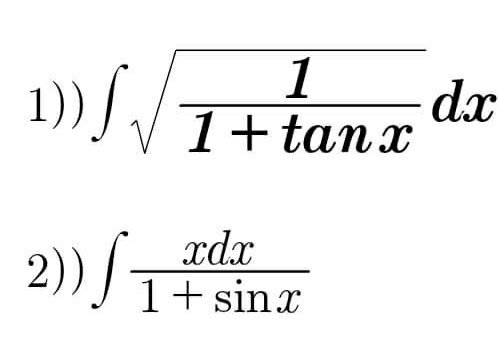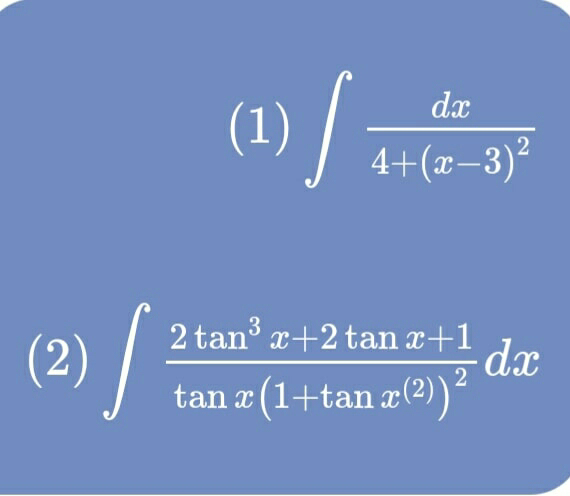
Question and Answers Forum
IntegrationQuestion and Answers: Page 228



Pg 223 Pg 224 Pg 225 Pg 226 Pg 227 Pg 228 Pg 229 Pg 230 Pg 231 Pg 232
|
Question and Answers Forum |
IntegrationQuestion and Answers: Page 228 |
| let f(x) =∫_(−∞) ^(+∞) (dt/((t^2 +ixt −1))) with ∣x∣>2 (i^2 =−1) 1) extract Re(f(x)) and Im(f(x)) 2) calculate f(x) 3) find olso g(x) =∫_(−∞) ^(+∞) (t/((t^2 +ixt −1)^2 ))dt 4) find values of integrals ∫_(−∞) ^(+∞) (dt/((t^2 +3it −1))) and ∫_(−∞) ^(+∞) ((tdt)/((t^2 +3it −1)^2 )) 5) give f^((n)) (x) at form of integrals. |
| ∫_1 ^x x^2 −3x(√x)dx =((−716)/(15)) then calculate ∫_x ^(x+1) (1/(x+3))dx |

|
| find ∫ (√((x^2 −4x+1)/(x+2)))dx |
| 1) find ∫ ((x+1)/(x^3 −3x −2))dx 2) calculate ∫_4 ^(+∞) ((x+1)/(x^3 −3x +2))dx |
| let f(t) =∫_0 ^∞ ((ln(1+tx))/(1+x^2 ))dx with ∣t∣<1 1) determine a explicit form of f(t) 2) find the value of ∫_0 ^∞ ((ln(1+x))/(1+x^2 ))dx |

|
| For what values of a and b will the integral ∫_a ^b (√(10−x−x^2 ))dx be at maximum |
| let F(x) =∫_x^2 ^x^3 ((sin(t))/(t+x)) dt 1) calculate lim_(x→0) F(x) and lim_(x→+∞) F(x) 2)calculste lim_(x→0) F^′ (x) and lim_(x→+∞) F^′ (x) |
| ∫x tan(x) dx |
| let B(x,y) =∫_0 ^1 (1−t)^(x−1) t^(y−1) dt 1) study the convergence of B(x,y) 1) prove that B(x,y)=B(y,x) prove that B(x,y) =∫_0 ^∞ (t^(x−1) /((1+t)^(x+y) )) dt 2) prove that B(x,y) =((Γ(x).Γ(y))/(Γ(x+y))) 3) prove that Γ(x).Γ(1−x) =(π/(sin(πx))) for allx ∈]0,1[ |
| ∫_( 0) ^( (π/2)) sin^(−1) (m cosθ) dθ |
| calculate ∫_0 ^∞ x e^(−(x^2 /a^2 )) sin(bx)dx with a>0 and b>0 |

|
| ∫_0 ^1 ∫_0 ^1 (dy/(1+y(x^2 −x))) dx |
| Σ_(n = 1) ^m ((log n)/n^(3/2) ) |
| ∫((cos x)/(2+3sin x+sin^2 x))dx |
| ∫((1+×)/(√(1+×^2 )))dx |
| find the value of ∫_0 ^(π/2) (dx/(1+(tanx)^(√2) )) . |
| let f(z) =((cos(3z))/z^2 ) calculate Res(f,0) . |
| ∫((√((sinx)/x^3 ))/x^3 )dx |
| let f(z) =((sin(2z))/z^n ) with n integr natural calculate Res(f,0) |
| calculate ∫_0 ^(π/2) (ln(cosx))^2 dx |
| calculate ∫_0 ^∞ ((sin^2 (x))/(x^2 (1+x^2 )))dx |
| let f(z) =(1/(sin(πz))) calculate Res(f,n) with n integr |
| let f(z) =((sin(z))/z^2 ) calculate Res(f,0) |
Pg 223 Pg 224 Pg 225 Pg 226 Pg 227 Pg 228 Pg 229 Pg 230 Pg 231 Pg 232 |